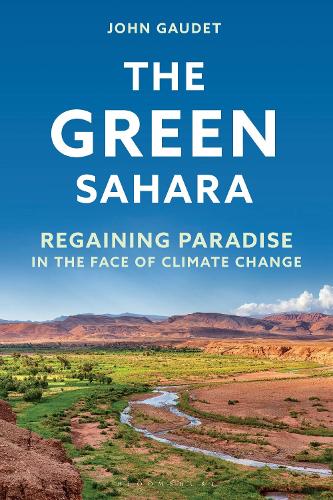
The Green Sahara: Regaining Paradise in the Face of Climate Change
(Hardback)
Publishing Details
The Green Sahara: Regaining Paradise in the Face of Climate Change
By (Author) John Gaudet
Bloomsbury Publishing PLC
Bloomsbury Academic
19th February 2026
United Kingdom
Classifications
General
Non Fiction
The environment
Physical Properties
Hardback
256
Width 152mm, Height 229mm
Description
A thoughtful exploration of how the Sahara Desert can be returned to its former glory as a green paradise while actively combating climate change.
A green Sahara is something the world has not seen since 10,000 BC when the Sahara was a wet, lush region. Grasslands, woodlands, tropical forests, and wetlands, the natural plant bounty of the ancient Sahara, provided residents with enormous flocks of birds, fish in abundance, indigenous grains and herds of wild game. By 3,000 BC though the climate changed, the rains stopped, and the ancient green Sahara dried into todays desert. It had been the victim of a phenomenon that reminds us today of global climate warming, a tragedy that we have unwittingly brought upon ourselves. But what if we could reverse the desertification of the Sahara, and bring back the green paradise of days passed
In The Green Sahara: Reclaiming Paradise in the Face of Climate Change, John Gaudet explores the process by which climate change in ancient times converted a green paradise into an arid desert land, highlighting parallels to what is happening in our time. But he also illuminates how an intense effort to create green energy is being made by several Saharan countries to build and operate enormous solar and wind farms. As a result, a wave of green energy generated in the Sahara, the largest desert on earth, is about to swamp the world, and could lead to a regreening of the Sahara Desert. If a new green Sahara happens, how will the world benefit
Covering just 20% of the Sahara Desert with wind turbines and solar panels would generate almost five times more energy than is currently needed worldwide. Gaudet highlights further benefits of regreening the Sahara by deploying climate technology to the desert such as sequestering large amounts of carbon from the atmosphere and eliminating negative health and ecosystem effects felt worldwide from desert dust. Gaudets manifesto demonstrates how, in this fascinating case, climate change induced by man actually has the power to save the world and restore a beautiful piece of ancient history.
Author Bio
John Gaudet was an ecologist and author of Papyrus: The Plant that Changed the World (2014) and Pharaoh's Treasure (2018). He was a Fulbright Scholar and spent 17 years in Africa establishing environmental programs throughout the continent. He wrote for National Geographic, The Washington Post, Salon, and Huffington Post, among other publications. He lived in McLean, VA.
